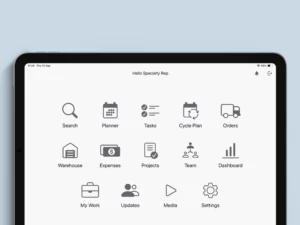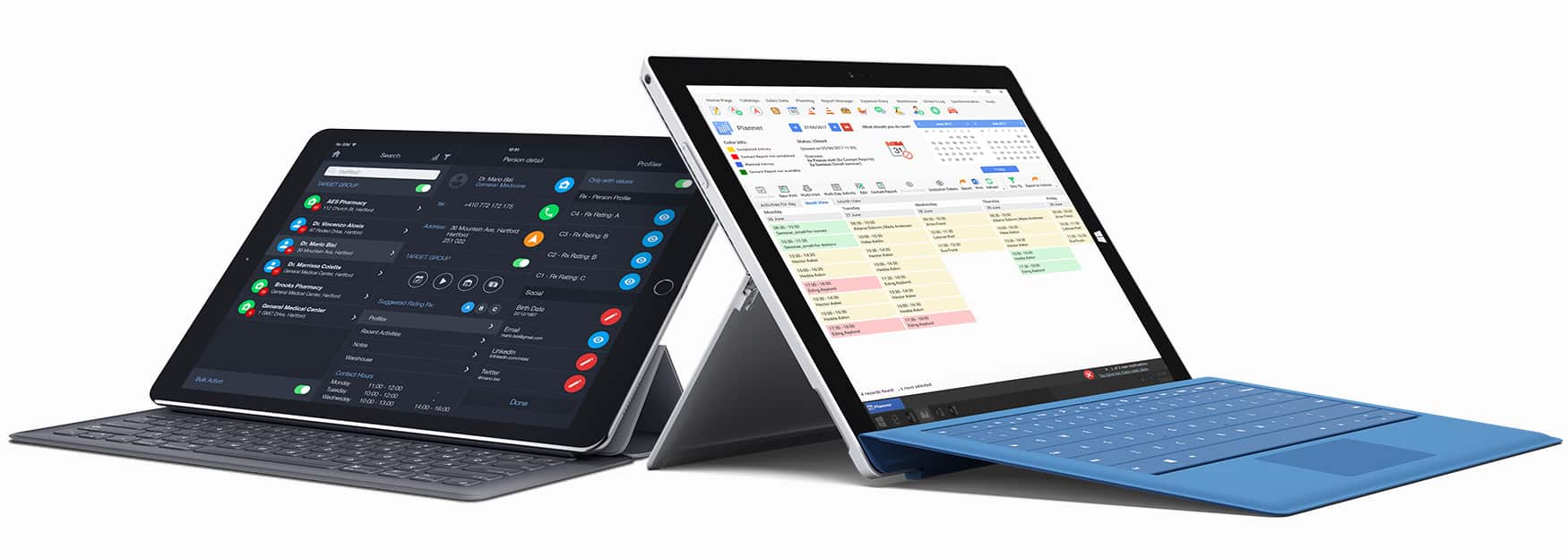Sales pros know how valuable a good CRM solution is, and they know how frustrating a bad one can be, too. When CRM fails to deliver, it’s easy to blame the software when in fact it was poor planning that spiked the project. Here are a few tips to avoid ruin down the road and make your CRM program fly.
Figure out why you need CRM in the first place
A lot of people think of CRM as a glorified address book, but done right, CRM can be a superb collaboration tool for sales, marketing, customer service, and even your back office. It tells you who your customers are, what they’re interested in, and the best way to grab their attention. It’s also a great way to share this information with everyone who needs it.
To see immediate gains once your CRM is in place, you need to figure out what you really want to get out of it. Even a solution that fits your business like a glove won’t do much if you don’t have a plan for how you want to use it — and that requires knowing what you want to use it for.
Take a look at your sales funnel and see where it needs improving. Conversion rates too low? You’re probably not targeting the right customers. The best way to fix that is to put your customers in the right segments. Better segmentation leads to better targeting, which leads to shorter, faster sales cycles. Choose a CRM that will let your sales team collect the information you need to create customer segments they can actually use.
Have a problem with experienced sales reps leaving your company and taking all their customer knowledge with them? Choose a CRM that makes it easy for reps to record all the information you want to keep after they leave. It will not only keep that knowledge in-house, but it will also make replacing them easier if all the information your new reps need is already at their fingertips.
Don’t forget about your non-sales users
If you think CRM is only for “sales reps” then you need to step back and take a wider view. CRM is a pipeline for shared information, not a lock box where you put stuff in and forget about it. Sales managers need to know what their sales reps are up to. Marketing and product managers need to know what customers care about. Finance managers need to know how much is in the sales pipeline, and so on.
Shared insights bring clarity and coordination, and allow you to implement strategies that propel growth. The key to choosing the right CRM is to know what everyone needs to get out of it to do their part. So, make sure the CRM you choose allows you to get the right information to the right people, whether they’re on the front line, in the back office, or up in the C-suite.
When evaluating a potential CRM, look at what kind of reports you can pull out of it. Do they tell your non-sales users what they need to know? And just as importantly, look at how easily it allows you to get information into it. Does the system make it easy to enter data you’ll want to extract from later?
Taking into account the informational and operational needs of each user group will make sure more bases are covered when your CRM solution is implemented, which means higher acceptance across the board. Knowing what kind of information you need to extract from the CRM system also makes it a lot easier to figure out what kind of information you expect people to put into it.
Choose a CRM built for your industry
If you work in a highly specialized or regulated business, you want a CRM built for your industry. A generic, small business CRM won’t have the features you need, and it probably won’t comply with your industry’s regulatory requirements, either.
The drug industry’s a good example of this. It has a very complex and highly regulated business model and the CRM systems pharma companies use, like Inception CRM, tend to be highly specialized to support their needs.
Whatever your industry or vertical, there’s probably a CRM built with your business in mind. Or several. Focusing on solutions built for your industry will bring you closer to finding the right fit since many of the features you need will have already been demanded by other customers.
Software marketplaces like Capterra, G2, and Software Advice have comprehensive listings of CRM solutions that you can filter by industry. They provide detailed product information alongside customer reviews and are good places to start building a shortlist.
Choose a CRM that fits your sales model
Every company is different and there’s no one-size-fits-all approach to CRM that will work for all of them, even within the same industry. Most industries contain multiple verticals and software vendors know this, which means there’s probably a solution built for your particular sales model, as well.
Niche solutions comprise the majority of the software market since that’s where smaller companies can differentiate and carve a space for themselves. Don’t choose a CRM because it is considered the “best,” choose the one that is the best fit for your company. Otherwise, the only thing it will produce is hatred of CRM.
You want a CRM system that supports the things your sales reps actually do to make a sale. Do you sell to other businesses or directly to consumers? Do your reps “sell” the product directly or influence others to take actions that result in sales down the line? How many people do you have to talk to to make a sale?
If your sales model is relatively simple (i.e., grab a lead, make a pitch, then negotiate a deal), you probably don’t need a super complex CRM system. You need a user-friendly one that aligns with your funnel. But if your sales model is highly complex (e.g., it requires to you reach out to a lot of different people in multiple organizations), then you want a CRM that matches that complexity.
But no matter how complex your sales model is, choose a CRM that’s easy to work with. CRM should eliminate, not introduce, friction into your sales processes. A CRM that’s intuitive and easy to understand will have a shorter learning curve, resulting in higher user acceptance and quicker productive gains following its implementation.
Choose a CRM that makes it easy to collaborate
Your sales reps are one of the most valuable sources of customer intelligence you have. They engage directly with customers and know more about them on an individual level than anyone else. So, don’t think of CRM as merely a tool to help reps sell better. Think of it as a collaboration tool that allows the sales reps to share insights with the rest of the organization — and vice versa.
CRM brings the most benefits when it works as a cross-functional platform, allowing sales, marketing, and other functions to work together. If one group of people has information that can help move a sale, CRM is the place to share it. Doing so will allow you to “close the loop” between sales and marketing.
Sales reps can help marketing craft better messages by sharing what their customers care about and want, and in return, marketing can leverage those insights to give sales reps better assets they can use. When the insights gained by one part of the company improve the outputs of another, you’ve made the whole company more unified and efficient. When those insights drive better customer experiences, you’ve closed the loop.
But here’s the thing: the information that gets shared should be as quantifiable as possible. Free text notes won’t cut it. Your CRM should give sales reps a way to capture discrete, comparable data points that marketing teams can use to identify customer segments that are truly useful, and product teams can use to identify the features that really matter.
Choose a CRM you can easily customize
A great CRM system will help you grow, but growth means change. Systems that are too rigid won’t keep pace with the changing needs of your business. Your CRM should let you test your sales processes so you can adopt new ideas and change your strategies when needed.
When marketing identifies new trends in your space, you want to be able to easily update call scripts so sales reps can ask customers what they think about them. Likewise, sales users need to be able to flag customers who express new sales objections so marketing can help craft responses that they can use — and then provide feedback on how well they work!
A CRM you can easily customize will give you the flexibility you need to figure out which strategies work, and which don’t, so you can optimize your processes around them. It will keep track of what you’ve learned and help you apply that knowledge so you can be more efficient, effective, and focused going forward.
Just remember, even the best solution in the world won’t be perfect on day one. Or day two, or day three. That’s because the definition of perfect changes with the speed of business. So, choose a CRM that’s complex enough to support the changes you need, but not so complicated you won’t be able to do it.
The Takeaway
Choosing the right CRM isn’t easy. It requires diligence, planning, and a budget. But a good CRM, even an expensive one, will pay for itself if you choose well. The first, most important part of that is to decide what you want to get out of it. And by you, I don’t mean just the sales team, but everyone who needs to use it. Figuring this out will not only tell you what features you need, but it will also help you recognize the right solution when you find it.
To focus your search, start with solutions built for your industry, then narrow down your list to those that best fit the way your salespeople actually sell. With luck, you’ll find a few that look like perfect fits. Let your final decision be guided by things like user-friendliness and how well they let your users collaborate. But just as importantly, choose a CRM you can easily customize so that it works for you now, and into the future.
Are you a pharma, biotech, or life science company looking for a CRM built for a business like yours? Inception CRM might be the solution for you. We support hybrid, face-to-face, and remote sales teams with a wide range of tools that are ideal for primary care, retail pharmacy, and key account sales models. It’s highly configurable and can be tailored to support each part of your business that uses it. Users love it. Managers love it. Try it out for yourself.










